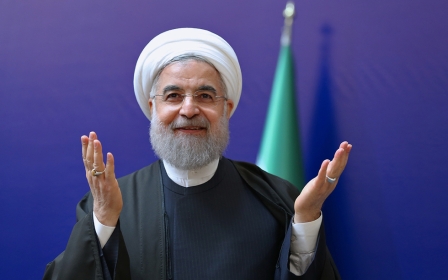Iran set to press US for compensation for decades of 'hostile action'

Iran's parliament on Tuesday voted through a law obliging the government to demand damages from the United States for 63 years of "hostile action and crimes," state television reported.
"The government has the duty to take the necessary measures seeking compensation for material and moral damages caused by the United States" to the country and Iranians over the past 63 years, the text reads.
It cites "material or moral damage" caused by the US during the coup against nationalist leader Mohammad Mossadegh (1953), during the Iran-Iraq war (1980-1988), in the destruction of oil platforms in the Gulf and via espionage targeting Iran.
The move comes in the wake of the US Supreme Court ruling last month that frozen Iranian assets held in the US should be used to pay compensation for acts of Iranian-backed "terrorism". The ruling has raised doubts about the fulfilment of the sanctions-lifting element of the Iran nuclear deal struck with world powers last year.
In 2013, the US admitted for the first time that the 1953 coup had been orchestrated by the CIA, with British support, "as an act of US foreign policy, conceived and approved at the highest levels of government".
Parliament did not specify a sum, but Vice President Majid Ansari said during the debate that Iranian courts had already ruled that the US should pay $50bn in damages for its "hostile actions" towards the country.
The law was passed by the conservative-dominated outgoing parliament in response to the US Supreme Court decision last month.
On 20 April, the US court ruled that Iran must hand nearly $2bn in frozen central bank assets to the survivors and relatives of those killed in attacks it has been accused of organising.
Those attacks included the 1983 bombing of a US Marine barracks in Beirut and the 1996 Khobar Towers bombing in Saudi Arabia.
The ruling affects around 1,000 US citizens.
On 10 May, President Hassan Rouhani said Tehran was preparing international legal action to recover the nearly $2bn in frozen assets.
"We will not allow the United States to swallow this money so easily," he told a crowd of thousands in the southeastern city of Kerman.
The Iranian funds are currently frozen in New York.
Iranian officials have complained that Washington is not doing enough to encourage investment in Iran, despite the landmark nuclear accord with world powers that resulted in sanctions being lifted.
Stay informed with MEE's newsletters
Sign up to get the latest alerts, insights and analysis, starting with Turkey Unpacked
Middle East Eye delivers independent and unrivalled coverage and analysis of the Middle East, North Africa and beyond. To learn more about republishing this content and the associated fees, please fill out this form. More about MEE can be found here.




